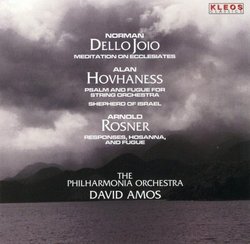Meditations on Dello Joio, Hovhaness, and Rosner
Thomas F. Bertonneau | Oswego, NY United States | 12/17/2002
(5 out of 5 stars)
"This Kleos CD brings together a program in which, in two cases, the composer has augmented the string orchestra with an obbligato instrument - Alan Hovhaness (1911 - 2000) adding flute and tenor voice in his "Shepherd of Israel," and Arnold Rosner (born 1945) adding a harp in his "Responses, Hosanna, and Fugue." Norman dello Joio's (born 1913) "Meditations on Ecclesiastes" and Hovhaness' "Psalm and Fugue" are for strings alone. "Meditations on Ecclesiastes" (1957) is something of a minor classic; on the strength of it Dello Joio won a Pulitzer Prize for music. There have been a number of recordings over the years, most recently with James DePreist and the Oregon Symphony on a Koch CD, coupled with Menotti's full-orchestra "Apocalypse." The idea of the work - technically a set of variations on a theme - comes from the Old Testament. The Preacher (Ecclesiastes) preaches that "to everything there is a season," and so forth. The verses are well known. Each of the variations corresponds to one of the verses: "a time to born," "a time to die," "a time to plant and a time to pluck up that which is planted..." There are ten variations in all, wending their way modally and contrapuntally through the many emotions implied by the text. Dello Joio produced a number of impressive works using the variation technique, but the "Meditations" represent his most rigorous application. David Amos, who conducts all of the scores on the disc, leads the Philharmonia Orchestra in a robust reading; he is obviously committed to the music and stands up well against DePreist. Hovhaness' "Prelude and Fugue" is what its title indicates. I like fugues (see my review of Reger's "Variations and Fugue on a Theme by Mozart" under Polyansky on Chandos) and I like this one by Hovhaness. "Shepherd of Israel" is lovely, if rather more diffuse, as is often the case with this prolific composer. The cantorial singing is a nice gesture, as is the addition of the flute as a touch of exotic "color." I confess that I bought this disc for the Rosner item. Arnold Rosner, who teaches at Kingsborough Community College in New York State, is the composer of many works in all genres written in an accessible but by no means simplistic idiom who has had to fight for performance through those decades when only serial cacophony measured up to a species of musical rectitude. I know three of his four string quartets from an Albany CD, as well as a mixed program from Laurel, featuring the impressive "Concerto Grosso," which is symphonic in all but name. Oddly, "Responses, Hosanna, and Fugue" (1977) is rather more of a concerto grosso than the actual "Concerto Grosso." It brings together a quartet of solo strings, augmented by harp, with a full string orchestra, and it exploits the full range of antiphonal effects made possible by the combination. Rosner has studied the music of the Renaissance polyphonists and listeners will hear echoes of them in this and other scores. The influence of Vaughan Williams' "Tallis Fantasia" will also be noticed, especially in the invocation of organ sonorities from the massed strings of the ripieno. I do not wish unduly to emphasize these "influences," however, as Rosner's is an individual voice. In the first section, "Responses," the four string soloists and the harpist take marvelous lyrical flights against the "choral" presentation of the full string band. The second section, "Hosanna," is dance-like and celebratory. The third section, "Fugue," resumes what has gone before in vigorous, if not rigorous, imitative style. I wish that my local orchestra, the Syracuse Symphony, would program this piece. It is remarkably outgoing, warm, and magnanimous music. Especially for "Responses, Hosanna, and Fugue," I strongly recommend this disc."


 Track Listings (22) - Disc #1
Track Listings (22) - Disc #1